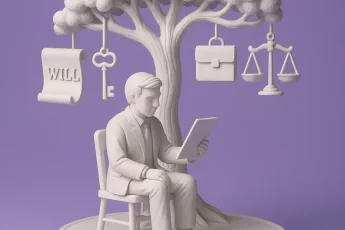What are the risks of being an Executor?
Being named as an Executor in someone’s Will involves significant responsibility and is not a role to be taken lightly. Midwinters Partner, Mark Lynham (mark.lynham@midwinters.co.uk ), explains more:
If you are appointed as an Executor in the Will of a loved one or friend, you need to consider carefully if this is something that you wish to accept because the responsibilities of being an Executor are significant. You should always consider if you need to take some advice from a professional, if only for reassurance that you are getting it right.
You are not required to accept being appointed as an Executor in a Will if you do not want to do so and sometimes people either do not feel capable of administering an estate or would prefer others to do it. Usually, you can renounce your appointment, but this should be done as soon as possible because it may be too late to renounce later if you begin to take steps to administer the estate, something known as “intermeddling”.
If you do accept the appointment, you should consider if you need to take advice because, as an Executor, you will owe duties to a number of different parties.
You owe duties to the Beneficiaries of the estate to make sure that the estate is administered correctly, that all of the assets are identified and valued, that all debts are paid off and that no steps are taken which result in losses to the estate.
You also owe duties to the Probate Registry and HMRC to ensure that the estate is reported accurately.
Finally, you also owe duties to any Creditors to the estate, which is any party which is owed money by the estate. This includes, perhaps surprisingly, any unknown creditors to the estate although steps can be taken to mitigate this risk.
Also, it is important to appreciate that your responsibility as an Executor is often a personal one and, in extreme cases, you could be personally liable to compensate someone who loses out financially because of an error you make. For example, if you fail to properly finalise the deceased’s tax position, you could be penalised by HMRC. Likewise, if you fail to properly identify and settle any debts, you could be personally held responsible for the payment of such debts.
This is a very brief summary of the responsibilities of being an Executor. If you are in any doubt about what to do, you can always seek help and advice from a solicitor.
At Midwinters, we can offer an obligation-free initial appointment and can tailor our services to suit your particular circumstances. Please call us on 01242 514 674 to discuss further.





